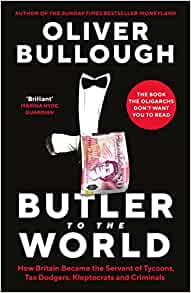LOOKING THE OTHER WAY
Not a day goes by without a newspaper, television, or radio report about the seizure of multi-billion-dollar assets owned by oligarchs with links to the Russian president Vladimir Putin. Since February 24th 2022, when Putin launched his invasion of Ukraine, the global authorities have appropriated valuable real estate, rare works of art, and more than half a dozen super yachts including a $90 million vessel belonging to Viktor Vekselberg, founder and president of the Russian conglomerate Renova Group.
It’s an eyewatering haul but still a tip off the iceberg when you consider that oligarchs have been hiding their assets for years while using/abusing the courts to suppress awkward questions about the true source of their wealth. Let’s also not forget that no matter how many yachts or mansions are seized in high profile raids, many others are already beyond the reach of the authorities. The real question is how these individuals were able to spend – or should I say – launder their extreme wealth in plain sight of the very governments who are now clamping down on them?
Butler to the World is Oliver Bullough’s coruscating account of how the British government looked the other way as a network of highly paid lawyers, dodgy accountants, investment bankers, business consultants, and PR experts bent the rules to facilitate the financial needs of kleptocrat leaders, crooked tycoons, industrial scale tax dodgers, and even drug barons. Heads should be hanging in shame at these revelations, but in the parallel universe of the stratospherically wealthy and their sycophantic hangers on, shame is an emotion that only those with a conscience can understand!
Britain’s role as a facilitator, or butler, grew from its lost prestige as a military power after the 1956 Suez crisis. The operation to retake the Suez canal may have been an embarrassing failure, but it laid the ground for the country to reinvent itself as an offshore financial centre just as the sun was beginning to set on its empire. Key to the process was the accidental creation of the Eurodollar, “one of the most consequential financial tools of the twentieth century”, which allowed banks to raise limitless amounts of cash while sidestepping restrictions by the US Federal Reserve (America’s central bank) on overseas Dollar loans. The concept gained traction over the decades and made the City (London’s financial district) a good place to do business. With the addition of light touch bank regulation and limp-wristed rules around money laundering and compliance, it wasn’t long before Britain gained a reputation as a safe haven for criminals to park their ill-gotten gains with few if any questions asked. The rest as they say is history!
Bullough does a splendid job explaining how Britain’s former colonial territories have inserted themselves into this complex laundering architecture, and how the flow of unfettered money has bled its way into political life. A 2020 report by the Parliamentary Intelligence and Security Committee on Russian Influence in the UK, revealed how the government wasn’t above taking money without even bothering to inquire where it came from in the first place…in other words there wasn’t much by way of due diligence!
Britain has been welcoming oligarchs into the country since the 1990s and politicians haven’t been slow to take advantage of their outsize political donations and lavish hospitality. Splashing the cash brings attention or even a seat at the top table of government. Since 2020 Yevgeny Lebedev, son of a Russian billionaire and former KGB officer, has sat as a crossbench life peer in the House of Lords. It was Boris Johnson who nominated him for the honour when he was Prime Minister, overriding the concerns of his own security experts. With hindsight, Lebedev’s elevation to a peerage shouldn’t have been that much of a surprise as Johnson had reportedly attended caviar and vodka parties hosted by both the father and the son when he was Mayor of London! For the record, Lebedev denies he is a security risk. In 2018 Boris Johnson admitted playing a tennis match four years earlier with the wife of a former Russian minister who donated over $185,000 to the governing Conservative party. All of which makes the comment of former Prime Minister Theresa May, “There is no place for these people, or their money in our country”, look ridiculously naive!
After reading Butler to the World, it’s hard not to feel anger and an overwhelming sense of disgust. How can a tiny minority of people get away with stealing money destined for some of the world’s poorest communities, and not even be made accountable? Why was the UK government slow to act when journalists and financial investigators exposed the weaknesses in the system that enabled these appalling abuses? And where does this leave Britain’s reputation for decency, honesty, and fair play? There is no easy answer and although the government has imposed a raft of sanctions on Vladimir Putin and his cronies after Ukraine’s invasion, it’s impossible to say how hard they’ll really hurt. As for the “butler”, well he’s patiently biding his time in the corner until he can quietly pick up from where he left off.
Reviewed by Juliette Foster




